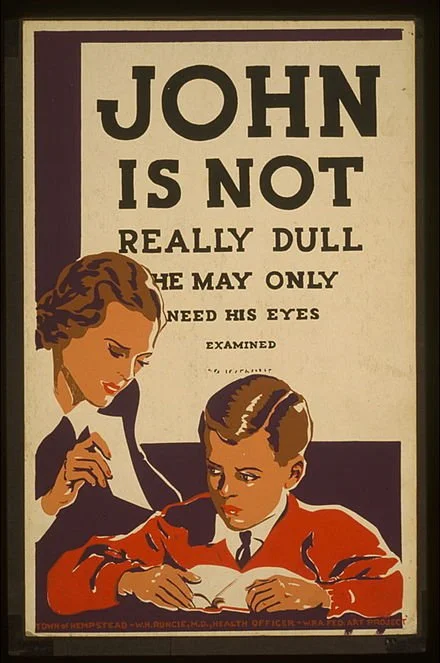Chris Powell: Many poor kids can’t see well and neither can government
Public education poster urging eye exams for children — Works Progress Administration, circa 1937
MANCHESTER, Conn.
Someday, if the governor and state legislators ever tire of coddling the state employee unions and if the president and Congress ever tire of coddling investment banks and military contractors, maybe they should note what happened recently at Silver Lane Elementary School in East Hartford.
Most of East Hartford's students are from poor households and most have limited if any medical insurance. So a wonderful charity from Los Angeles called Vision to Learn has been visiting the town's schools, offering students free vision screenings and eye examinations, free optometric prescriptions for those who need them — and then free prescription eyeglasses too.
Participation is up to parents, but about two-thirds of Silver Lane Elementary's 300 students have participated in the program and three weeks ago 53 of them received their free prescription glasses.
That is, about 18 percent of the school's student population needed glasses but didn't have them, and the percentage of students in need at the school is almost certainly higher because another hundred or so students weren't examined.
Vision to Learn's premise is compelling: that children who can't see well aren't likely to learn as well as they should, that as many as a quarter of the nation's children will need glasses while they are in school, and that without the glasses they need, poor children may be misdiagnosed with behavioral problems and leave school prematurely.
If the Silver Lane Elementary experience of unmet vision need is projected nationally and considered along with the other unmet medical needs of students from poor households, the situation should horrify.
State government is aware of the problem. The state Public Health Department finances 90 student health clinics at schools in 28 towns, and a study group including state officials and state legislators has just reported that 157 more schools in poorer municipalities very much could use clinics as well. Legislation pending in the General Assembly would appropriate $21 million for increasing or expanding school clinics. That's nowhere near enough to address the need fully, especially since most of the clinics don't offer vision and dental services.
Meanwhile, the legislature seems ready to appropriate what is estimated at more than $300 million for raises and benefit increases for unionized state employees, though they never lost a paycheck during the virus epidemic. Meanwhile, the employees of community social-service agencies remain poorly paid and underinsured as they care for the needy at half the cost of state government employees.
A bigger disgrace here may be that amid its creation and distribution of infinite money for less compelling purposes, the federal government has not resolved to finance health clinics for all school systems in the country.
The biggest disgrace may be that more than 50 years after the federal government declared a war on poverty, there is still so much of it with so many people unable or unwilling to take care of their children. What passes for liberalism now pursues more vigorously what it sees as grander causes: unrestricted abortion and transgenderism.
xxx
A less expensive but more difficult issue of children's health also faces the General Assembly: whether state Medicaid insurance, known as HUSKY coverage, should be extended to more children living illegally in Connecticut.
Last year the legislature extended coverage to illegal residents 8 and younger, a strange compromise of budgeting. For except for the expense, why should 8-year-olds be covered but not children from 9 to 17?
The best arguments against extending coverage are that its cost is uncertain, that it will facilitate more violation of immigration laws, and that it may draw to Connecticut more immigration lawbreakers from other states.
The best arguments for extending coverage are that sick children will be treated anyway by walking into a hospital emergency room, with the cost passed along to other patients; that Medicaid insurance will treat illness before it becomes more expensive; and basic decency.
The cost of the new state employee union contract hasn't been fully calculated either, but the legislature will approve that one easily.
Chris Powell is a columnist for the Journal Inquirer, in Manchester.
